2006 December
About Andrew Cusack
 Writer, web designer, etc.; born in New York; educated in Argentina, Scotland, and South Africa; now based in London.
Writer, web designer, etc.; born in New York; educated in Argentina, Scotland, and South Africa; now based in London. read more
News
Blogs
Reviews & Periodicals
Arts & Design
World
France
Mitteleuropa
Knickerbockers
Argentina
The Levant
Africa
Cape of Good Hope
Netherlands
Scandinavia
Québec
India
Muscovy
Germany
Academica
Christmas
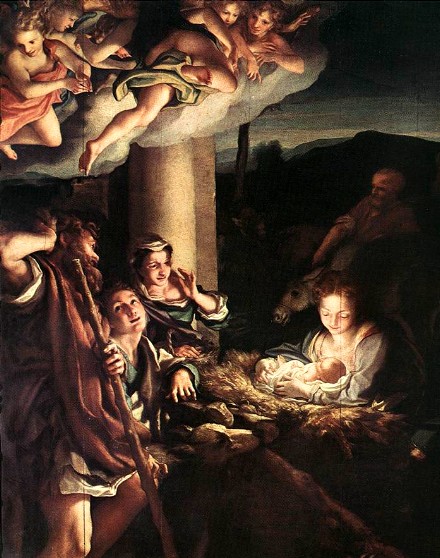
Corregio, Nativity
Oil on canvas, 101″ x 74″
1528-30, Gemäldegalerie, Dresden
Who with His life, the world to save,
All honor, power, glory, Thine,
and in Thy Heart our souls do bind.
a very merry and blessed Christmas.
Drink Audit Ale in Heaven With Me
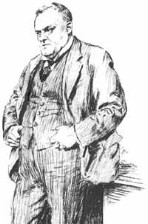
I pray good beef and I pray good beer
This holy night of all the year,
But I pray detestable drink to them
That give no honour to Bethlehem.
May all good fellows that here agree
Drink Audit Ale in heaven with me,
And may all my enemies go to hell!
Noel! Noel! Noel! Noel!
May all my enemies go to hell!
Noel! Noel!
WITH THESE SIMPLE and lovely lines, Hilaire Belloc superbly expressed the esprit de Noël of the Christian curmudgeon. It amounts, more or less, to “Rend honor to the Holy Child, and to hell with the rest”.
His Lines for a Christmas Card are obviously meant in a jovial and light-hearted spirit (naturally, we would not wish Hell on any poor soul) and are completely intelligible but for this curious line: “May all good fellows that here agree / Drink Audit Ale in heaven with me”. What on earth is Audit Ale?
Before the Reformation, the English year was a calendar of feasts, festivals, and holidays — holy days, even. Four of these holy days, spaced fairly evenly throughout the year, were marked for such things as the collection of rents and the paying of feudal tributes. These four were Lady Day (March 25, the Feast of the Annunciation), Midsummer Day (June 24, the Feast of St. John the Baptist), Michaelmas (September 29, the Feast of St. Michael the Archangel), and Christmas (December 25, of course, the Feast of the Nativity of Christ).
Now, events such as the collection of fees and taxes and the giving of feudal tribute tend towards the dour, and so often a feudal lord would have a special ale brewed for these occasions, to ensure a certain amount of merriment among the commonfolk once their tribute had been paid and the burden lifted. This tended to be called ‘audit ale’, since it was brewed around the time of audit.
They were not, you will be happy to learn, the only seasonal brews around. There was ‘leet-ale’ for when the manorial court, or court-leet, convened, and there was Whitsun-ale for Whitsuntide, and there were church-ales which went towards the upkeep of the parish church and alms for the poor. Indeed, in village of Sygate in Norfolk, there is an inscription on the gallery of the church which reads:
And give us good ale enow . . .
Be merry and glade,
With good ale was this work made.
Also, interestingly, the very word ‘bridal’ comes not from the -al suffix English developed up from Latin, but rather from the Old English brýd-ealo: bride-ale or wedding-ale.
With the advent of Protestantism — and most especially the Puritan variant thereof — feasts, seasons, and other joviality generally became frowned-upon. England was forced to be less English, as the monotonous bores took over.
Still, remnants of the feasts and seasons remained. Lady Day was the first day of the year in Great Britain and its empire until 1752, when the Gregorian calendar was finally adopted. Similarly, the fiscal year in the United Kingdom begins on April 6 because that day in the Gregorian calendar corresponds to Lady Day in the old Julian calendar.
 In Oxford and Cambridge, meanwhile, colleges still brewed special ales for the time when grades were released; either to celebrate the achievement or to soften the blow. These brews kept the old moniker of ‘audit ales’ and Belloc most likely uses the term in this derivation. Even in my own time at St Andrews we often sipped home-brewed ale from ancient, battered pewter tankards, though we rarely needed the excuse of holy days to continue the tradition.
In Oxford and Cambridge, meanwhile, colleges still brewed special ales for the time when grades were released; either to celebrate the achievement or to soften the blow. These brews kept the old moniker of ‘audit ales’ and Belloc most likely uses the term in this derivation. Even in my own time at St Andrews we often sipped home-brewed ale from ancient, battered pewter tankards, though we rarely needed the excuse of holy days to continue the tradition.
So this Yuletide perhaps you will consider home-brewing, and brew a special ale for the festal season now that the penetential time of Advent is passing. But, if you’re otherwise engaged, head into town and make sure to have a beer, and raise your pint to that Wondrous Babe whose birth brings us such mirth and cheer.
Christmas Book List
Mr. and Mrs. Peperium over at Patum Peperium asked a few of their genial friends to come up with a Christmas book list, and we were more than happy to oblige. Interestingly enough, the only overlap was Guy Stair Sainty’s giant two-volume opus, which was both on my list and on Fr. M.’s list. I have reproduced my list below for your perusal.
 Well, first up, the books you can’t even get yet, not because they’re out of print but, rather, because they’re not exactly in print yet.
Well, first up, the books you can’t even get yet, not because they’re out of print but, rather, because they’re not exactly in print yet.
The Dangerous Book for Boys by Conn and Hal Iggulden has proved a roaring success amongst discriminating readers in the British Isles. The nifty book is basically a handbook for life, describing in detail how to win at conkers and learn the rules of cricket as well as providing information about major battles of history, NATO’s phonetic alphabet, the golden age of piracy, and that trickiest of all subjects:girls. The book’s out in Britain, Australia, and New Zealand, we North Americans will have to wait until May of next year.
Another book the Brits have already is Michael Burleigh’s Sacred Causes: The Clash of Religion and Politics from the Great War to the War on Terror, the sequel to Burleigh’s brilliant Earthly Powers: The Clash of Religion and Politics in Europe from the French Revolution to the Great War. In the first book, Burleigh brilliantly outlined the “long nineteenth century” as historians call it, depicting in detail the interplay between faith, reason, and power on the Mother Continent. Sacred Causes promises to bring us from the First World War all the way to the current so-called “War on Terror”, and we expect it will be done with the same precise, detailed, though occasionally light-hearted spirit which Burleigh has mastered. The book will be available on these verdant shores from March of next year.
While we’re traveling across the Atlantic, why not explore the British roots of our American society? In America’s British Culture, the late great Russell Kirk explores the Britannic foundations of the core of American culture and civilization. The book’s probably out of print, but can nonetheless be found here and there, and if not to purchase then there’s always the local library to try.
Far more perilous than a voyage cross the Atlantic is that most worrisome, tiresome, and pedantic of journeys: crossing the channel. To Belgium, or perhaps we should say “Belgium”, for after reading Flemish patriot Paul Belien’s A Throne in Brussels: Britain, the Saxe-Coburgs and the Belgianisation of Europe you will find the mere concept of “Belgium” repugnant. I picked up a copy of A Throne in Brussels and decided to give it a whirl despite finding the book’s title mostly uninteresting. After reading it, I also found the subtitle a little misleading. What Belien actually gives us is an overview of the history of “Belgium” which is both succinct and thorough, mostly focusing on the Belgian monarchy and its deep influence on the formation of this “nation” half-French and half-Dutch. It makes for a fascinating read of disgrace and debauchery as we’re told of the disgusting actions of, firstly the various kings of Belgium from the creation of the country ex nihilo in 1830, and then of astonishing Belgian cowardice and collaboration in the First and Second World Wars. However all this pales in comparison to the most telling, and the most disturbing, part of the book which tells us about modern, post-war Belgium. I will not reveal it’s contents but is truly, truly frightening. The point Belien posits as the crux of the book is this: I’ve told you about Belgium. Recall that the Eurocrats and their enthusiasts extol Belgium as the model for European unity; a single state in which communities of different blood and language live together in supposed harmony. If what I’ve written is true, then be afraid: be very afraid. And you will be.
Moving across the Continent, we stumble upon dear old darling Austria. The late Gordon Brook Shepherd was a devoted admirer of the Austrian people and nation, and this is exhibited in a number of the fine, well-crafted books he wrote. The Last Hapsburg is a very good biography of the Blessed Emperor Charles of Austria-Hungary, the last to rule over that many-peopled realm. It reads as a chronicle of simultaneous hope and decline, and the chapters detailing the Emperor’s two attempts to regain his Hungarian throne are action-packed and read like a spy thriller. Prelude to Infamy, meanwhile, deals with that last great figure of Austrian tradition and reaction, Chancellor Engelbert Dollfuss. Brook Shepherd gives a splendid overview of Dollfuss’s early life and upbringing, his rise to power, and his eventual downfall at the hands of Hitler’s henchmen. Both these books are well worth reading, but I am also intrigued by the title alone of Brook Shepherd’s biography Between Two Flags: The Life of Baron Sir Rudolf von Slatin Pasha, GCVO, KCMG, CB, on which I have not yet been able to lay my hands.
Travelling deep within Europa’s belly are Patrick Leigh Fermor’s chronicles of his journey through Ruritania at the young age of twenty-two in the period between the wars when a great deal of the old order still remained. This meandering tramping trip, from London to Constantinople, is retold to us in Sir Patrick’s A Time of Gifts, considered a classic in the travel genre, and Between the Woods and the Water.
On his journey, Fermor came across a number of Europe’s aristocrats, nobility, and titled gentry. No doubt many-well, all really-of the honours and orders which bedecked their chests can be found in Guy Stair Sainty’s brand spanking new World Orders of Knighthood & Merit, out this year from Burke’s Peerage. The two volumes weigh in at twenty pounds imperial, containing two thousand pages and yours for a mere $375.
Cheaper, smaller, and infinitely more full of vim and moxie, however, is the delightful little picture book Simple Heraldry Cheerfully Illustrated by Sir Iain Moncrieffe of That Ilk, with truly cheerful illustrations by Don Pottinger. Both Moncreiffe and Pottinger served Her Majesty in the Court of Lord Lyon, Scotland’s heraldic authority, and the book is chock-full of delightful little explanations of the various aspects of heraldry, simplified and in digestible form.
But rememeber man that thou art dust and unto dust thou shalt return. If you’re lucky, that dust will be guarding the covers of the splendid Very Best of the Daily Telegraph’s Books of Obituaries which contains myriad tales of those individuals whose lives have been compacted onto the obituary page of Great Britain’s quality daily. Even more interesting is the more specific Daily Telegraph Book of Military Obituaries, containing various anecdotes of mess, ball, parade ground, and battlefield. How sad are the days when the only place one reads of class, dignity, and wit are the obituary pages! Or, as a friend puts it rather more alarmingly: every day more and more war veterans die off, while more and more products of government schools are unleashed into the world.
Yet our end ought to be a cheerful one, so catch up with that Grand Old Man who has since gone to join the Choir Invisible. The brilliant writings of Peter Simple are collected in a number of different volumes, most notably Peter Simple’s Century, which I warmly encourage the reader to purchase at the nearest opportunity. Better yet, make it two and forward one to me.

The Vicar’s Remorse
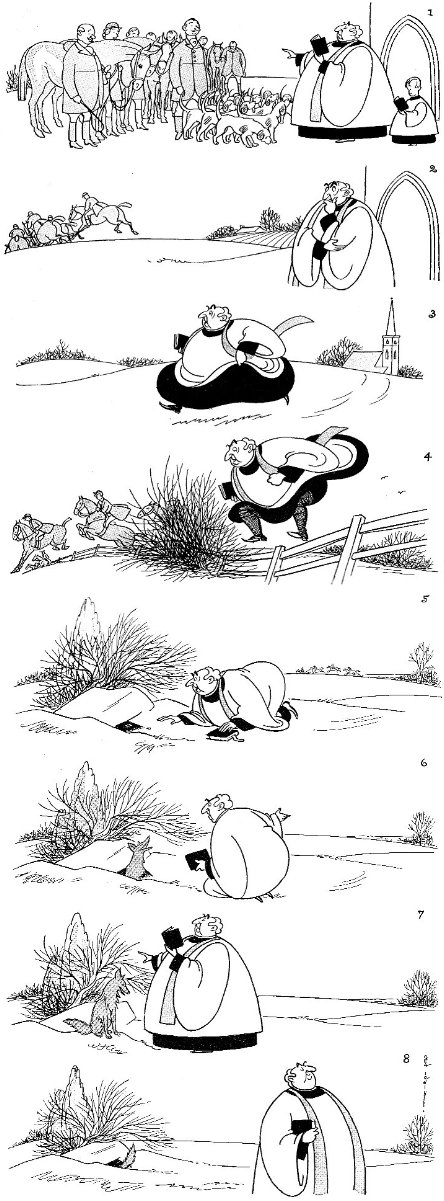
Previously: New York in November | The New Yorker Hunts | Tally Ho, Empire State!
Governors Island Revisited

EVERY ONE OF THE myriad plans put forth for the ‘redevelopment’ of the venerable old Governors Island in New York Harbor has so far either stalled, been neglected, or otherwise poo-pooed. In this, we have something to rejoice. As I have often said, realistically speaking there is little that can be done to it which will not neglect or disgrace the island’s long military heritage. The officially-approved ideas put forth so far have been horrific: an amusement park, a casino, a ‘technology park’, as well as a number of other vapid proposals.
Naturally, we’d be enthused if it returned to its former role as swankiest post in the entire Army and the home of Army polo, but don’t hold your breath. West Point being the single exception, if it has even a touch of history, tradition, or class, Congress and the Department of Defense will do their best to get rid of it. After all, the National Guard has been pulled out of the Seventh Regiment Armory, the Navy has withdrawn all but a few institutions from Newport, and the Army has left the ancient Presidio of San Francisco; how long will it be until Fort Leavenworth’s foxhounds are brought out back and shot by the Monotony Monitors? (more…)
Peter Simple IV
Affairs of state bother us often, and they even intrude into the mind of such worthies as that grand old man, Peter Simple. These two columns, the fourth in our series attempting to introduce you to the most brilliant columnist who ever was, deal with precisely such subjects: one foreign, and one domestic. The first was written in 2002, as Paddy Ashdown, the former leader of the Liberal Democrats (ennobled as Baron Ashdown of Norton-sub-Hamdon) was appointed to the post of ‘High Representative for Bosnia and Herzegovina’, a sort-of viceroyship created by the United Nations to keep an eye on wayward Balkan peoples. In ‘Glory’, Mr. Simple reflects upon the prospect. Reprinted below that is another example of ‘What the Papers Say’, in which, speaking through the editorial pages of the Feudal Times and Reactionary Herald, Peter Simple implores us to take a serious look at House of Lords reform. As per usual, his proposals are right on target.
Glory
 THEY say that Paddy Ashdown, the great Liberal leader, is to be given high office in Bosnia, as governor, no less. It will not be long, we monarchists all hope, before he is offered the crown and ascends the throne of Bosnia as King Paddy the First. The last king of Bosnia, Steven VII Tomasevic, surrendered to the Turks and was beheaded in 1463. But times have changed, and this should not necessarily be a precedent.
THEY say that Paddy Ashdown, the great Liberal leader, is to be given high office in Bosnia, as governor, no less. It will not be long, we monarchists all hope, before he is offered the crown and ascends the throne of Bosnia as King Paddy the First. The last king of Bosnia, Steven VII Tomasevic, surrendered to the Turks and was beheaded in 1463. But times have changed, and this should not necessarily be a precedent.
Approached by a joint delegation of the Serb, Croat and Muslim communities, he will at first pretend to put the crown aside, then yield to their urgent pleas. How glorious, when in Sarajevo, at a ceremony with specially devised ecumenical rites (Catholic, Greek Orthodox, Muslim, Methodist, agnostic, humanist, Salvation Army), the Secretary-General of the United Nations, Kofi Annan himself, places the crown on his head.
Loud the people’s acclamations, loud the pealing organs and massed choirs with all the bells of Sarajevo ringing out as leaders of the three communities swear allegiance! Later, he inspects a guard of honour of the happily named Nato Dissuasion Force, then tours the city.
His piercing blue eyes, screwed up with almost intolerable sincerity, scan the remotest forests and reactionary mountains for signs of emerging liberalism. Peasants in their picturesque costumes have trooped in from the countryside, bearing traditional gifts: ornamental daggers, pots of honey, embroidered shawls, clotted cream and new-laid eggs.
Folk songs mingle with the strains of “He’s A Jolly Good Fellow”, “Follow The Van” and (an allusion to the new monarch’s Irish ancestry) “If You’re Irish, Come Into The Parlour”. Helicopter gunships and squadrons of fighter aircraft fly past as the King chats easily to his people. They laugh heartily at well-chosen anecdotes of his time as Liberal leader. Distant explosions mark pockets of resistance, to be mopped up by the Bosnian army. He orders the search for “war criminals” – slab-faced Mladic and tousle-headed Karadzic – to be intensified.
As night falls, dense fumes of slivovitz hang over the sleeping city. A sound of massed snoring comes from the Royal Palace, where King Paddy sits at ease, regaling his courtiers with extracts from his Liberal party conference speeches and statements of liberal ideals: the need for dialogue and for a determined but carefully considered step forward into the future.
What the Papers Say
In a thoughtful leader, the Feudal Times and Reactionary Herald discusses reform of the House of Lords: “Since the arbitrary and unlawful expulsion of most hereditary peers from the Lords, those of our readers who lost their seats, as well as those few who retain them, may be inclined to regard any further suggestions for ‘reform’ with indifference and contempt.
“Debates on this subject both in the Lords itself and in the Commons may indeed have exhibited a level of inanity unusual even for those sadly degenerate bodies. Yet their very persistence in ignoring the real issues should only strengthen our own determination to confront them.
“In a recent debate, some speakers favoured an Upper House entirely elected; some an Upper House entirely appointed; some a mixture of elected and appointed members. Others, typical adherents of the foaming radical and contumelious schoolteacher tendency, wanted to abolish the Upper House altogether.
“Not one single speaker in either house suggested that the best measure of ‘reform’ would be to scrap the present hybrid assembly, including those chimerical figures, the so-called ‘life peers’, and, by retaining the remaining 92 peers and bringing back the 600 so outrageously expelled, restore the House of Lords which existed so satisfactorily for hundreds of years.
“We believe that a firm, uncompromising assertion of the hereditary principle would not only dispose of further futile argument but would be greeted with relief and enthusiasm by the still sound majority of English people, who, we dare aver, remain true in their hearts to the old beliefs which made our country great, and our Parliament the wonder and envy of the world.”
A New Hall in the Classical Style
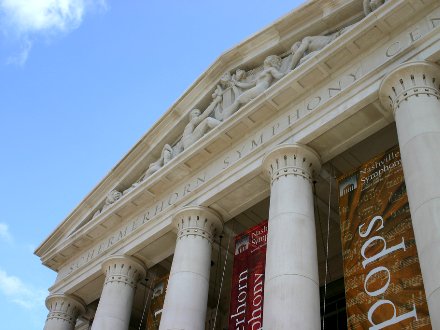
The Nashville Symphony recently built an entirely new concert hall named the Schermerhorn Symphony Center. While we decry ‘centers’—what’s wrong with a ‘hall’?—the name does hold some significance for us, because Schermerhorn is, of course, an old New York name. The Schermerhorns were one of the first families of New York and there are numerous places and things named after them throughout the city and state. This concert hall bears the name in honor of Kenneth Schermerhorn, born in the traditional Schermerhorn stomping ground of Schenectady, New York, and conductor of the Nashville Symphony from 1983 until his death in 2005. He had also previously conducted (during his military service in Germany) the symphony orchestra of the U.S. Seventhy Army and later the Milwaukee Symphony Orchestra, as well as serving as music director to the Hong Kong Symphony Orchestra and the American Ballet Theatre.
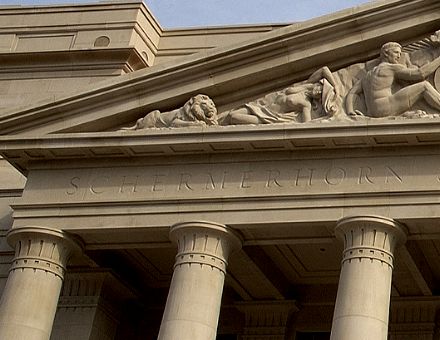
The new concert hall is built in an admirably traditional style, though if you look closely enough here and there you can see the craftsmanship still wasn’t quite up to snuff. Still, a step in the right direction, needless to say, and we decided to show you some photos for your general edification.
(more…)
New York in November

A Gaggle of Bonapartes
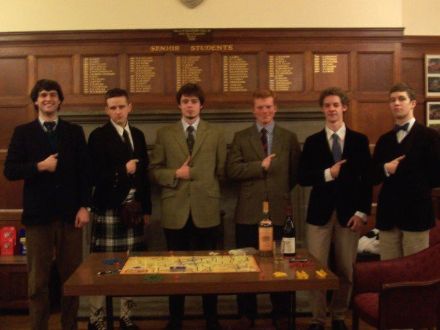
SOME OF MY best games of Risk were played during my St Andrews days: in Step Rock Cottage, in the A Squadron Mess, and a particularly enjoyable game in Canmore one evening when “Ishmael”, Stefano Costanzo, and I united our separate forces to defeat Abigail, whom we had summarily designated as a heathen ruler. (Once we had wiped her forces from the map of the world, we declared perpetual peace owing to our Christian brotherhood, and immediately adjourned to the Russell for a pint). I am glad, then, that the residents of my dear old St. Salvator’s Hall have initiated formal games of Risk. A good and wholesome pursuit, methinks. St Andrews is, according to those who know these things, the world’s foremost center for the study of “international relations” (the moniker by which the activity of correcting foreigners is known these days).
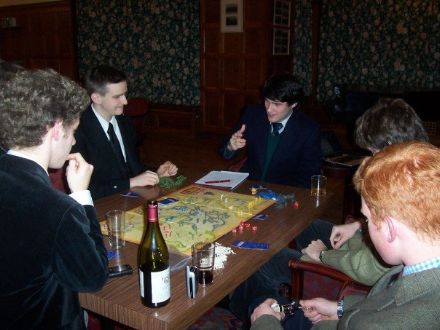
Herr Hoobler contributes a pithy remark about world domination.
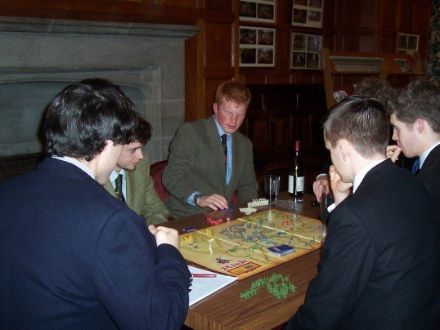
Paris Calling

Followers of worldy events in a technological fashion might be interested in viewing the world’s newest international news network, France 24. The English-language service, which can be viewed for free online, has so far proved more aesthetically pleasing than the American networks but seems a bit ‘light’ in terms of its content. Nonetheless, we will give it a year to flesh out before we hand down a final verdict.
Elsewhere: Wikipedia entry | France24: The Unofficial Weblog
Old Guard on Governors Island

A photo of the Old Guard of the City of New York on Governors Island, with Manhattan in the background, taken on St. George’s Day, 1933. [Click here for larger photo]
Previously: Evacuation Day | Marshal Foch and the Old Guard | A New York Funeral | Old Guardsmen | The Old Guard | Grandpa
Category: New York Militaria
Search
Instagram: @andcusack
Click here for my Instagram photos.Most Recent Posts
- Silver Jubilee November 21, 2024
- Articles of Note: 11 November 2024 November 11, 2024
- Why do you read? November 5, 2024
- India November 4, 2024
- The Lithe Efficiency of the Old Constitution November 4, 2024
Most Recent Comments
Book Wishlist
Monthly Archives
Categories



